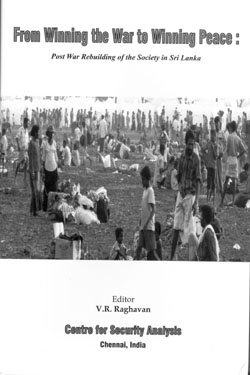The book under review is a collection of papers presented at a conference on From Winning the War to Winning Peace Post War Rebuilding of the Society in Sri Lanka’ jointly organized by the Centre for Security Analysis and Regional Centre for Strategic Studies at Colombo in August 2009. The underlying assumption of the conference was, with the military defeat of the LTTE, the situation in Sri Lanka ‘provides an opportune moment for reconstruction and peace building activities that will allow long-term social, economic and political stability to take root.’ The most challenging task, according to the editor, is in ‘taking timely, coherent and integrated action’ on the above three aspects. If just peace is not established, hard won military victory would be meaningless. Accordingly, the three major themes of the book are economic reconstruction, socio-ethnic cohesion, and political accommodation.
Economic reconstruction and development is a daunting task in any post-war society. In the case of SriLanka, where the society is much more polarized, it is even more challenging. The three major difficulties identified are: problems in mobilizing resources, lack of proper organizational capacity, transparency and effective resource allocation, and the absence of political consensus. To overcome the first two issues, excellent and innovative ideas are offered by Muthukrishnan Sarvananthan and SamanKelagama, two noted economists of Sri Lanka. The last one is surprisingly ignored. Without bi-partisan consensus, any political settlement to the ethnic question would be unsustainable. The political history of Sri Lanka since independence is witness to this.

